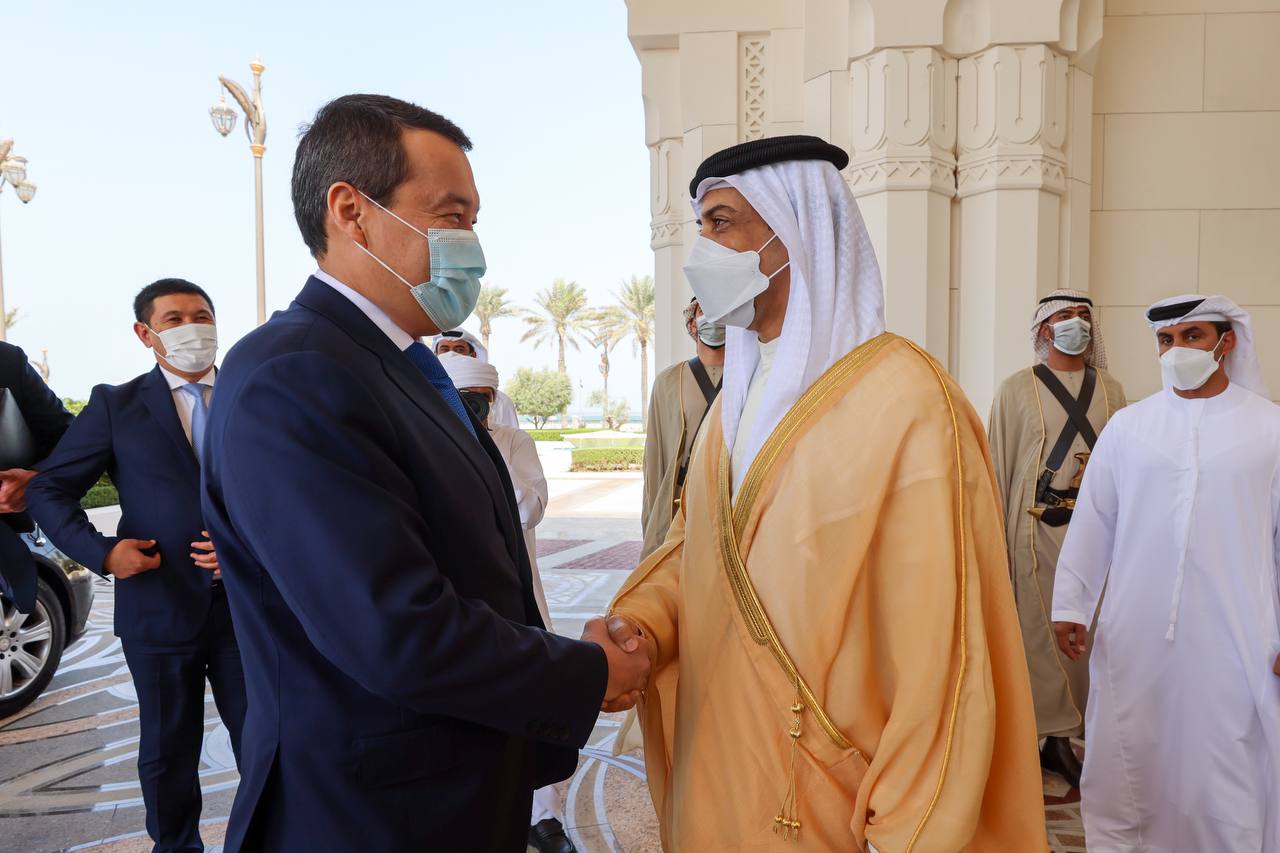Kazakhstan and the United Arab Emirates (UAE) have signed a number of commercial agreements, under which the two countries will implement $900 million worth of investment projects.
The documents which are supposed to strengthen cooperation in a wide range of economic sectors were signed as part of Kazakh Prime Minister Alikhan Smailov’s visit to Abu Dhabi this week.
“The Government of Kazakhstan continues to improve the investment climate," Smailov said, calling the Emirati partners to use all the available opportunities for cooperation.
"Despite the crisis in the world, the inflow of foreign direct investment in our country in the first quarter of this year grew by 54 percent to $6.8 billion,” he added.
UAE is Kazakhstan’s leading strategic, trade, and economic partner in the Arab region, most notably in the petrochemical, energy, transport, logistical services, agriculture, and space sectors. The UAE's direct investments in Kazakhstan over the past 16 years amounted to more than $2,6 billion.
Meanwhile, while in Abu Dhabi, Smailov met with Musabbeh Al-Kaabi, who heads Emirati state-owned Mubadala Investment Company which holds $285 billion in assets and ranks 13th in the world rating of sovereign funds. Following the meeting, Al-Kaabi voiced interest in investing in Kazakhstan’s green energy, finances, mining, and oil and gas sectors.
As a part of the visit, Smailov also held negotiations with Mohammed Al Suwaidi, Managing Director and Chief Executive Officer at ADQ - one of the largest holding companies in the region with direct and indirect investments in more than 90 companies.
In total, the Kazakh delegation presented the Emirati companies 40 investment projects worth $6.5 billion in mining, agriculture, oil and gas, and construction fields.
“We have serious potential in the areas of energy, chemical industry, agriculture, mining, and metallurgical complex. In this context, I would like to propose to participate in the implementation of new projects specially prepared taking into account the current situation in the world,” the prime minister stressed, according to his press service.
Smailov also highlighted the potential of the Trans-Caspian International Trade Route (TITR), known as the “Middle Corridor,” as the main pivot for realizing the transcontinental trade potential and attracting private investments. Kazakhstan is actively developing the Trans-Caspian International Transport Route, Smailov said, adding that it is planned to construct a shipbuilding plant along the shore of the Caspian Sea.
TITR runs from the Chinese Lianyungang seaport to the Chinese-Kazakh border, further through Kazakhstan, the Caspian Sea, Azerbaijan, and Georgia to Europe. Goods are transported by railway to the Kazakh seaports of Aktau and Kuryk and further sent to the Baku International Sea Trade Port (Port of Baku) in Azerbaijan by ships via the Caspian Sea. In Azerbaijan, containers are transported along the 826-kilometer Baku-Tbilisi-Kars railway toward Georgia and ultimately Türkiye. The route further splits up into two with both leading to Europe — one of them passes through the Turkish cities of Mersin and Istanbul and the Mediterranean Sea. At the same time, the other one stretches to the Ukrainian city of Chernomorsk via the Black Sea.
In 2021, the transit and container traffic on TITR surpassed 25,000 twenty-foot equivalent containers (TEU), increasing 20 percent from 2020. The participating countries intend to increase the volume of cargo along the route by six times to 3.2 million tonnes per annum.







 The number of evacuees from flooded areas in Kazakhstan has reached 97,852 people, including about 32,856 children since March 27.
The number of evacuees from flooded areas in Kazakhstan has reached 97,852 people, including about 32,856 children since March 27.
 The Islamic holy month of fasting, Ramadan comes to an end this week with the celebration of a joyous festival called Eid (meaning “festival” in Ar...
The Islamic holy month of fasting, Ramadan comes to an end this week with the celebration of a joyous festival called Eid (meaning “festival” in Ar...
 Iran's senior military leaders described the drone and missile attack on Israel on April 14 night as “successful".
Iran's senior military leaders described the drone and missile attack on Israel on April 14 night as “successful".
 Iranian President Ebrahim Raisi warned Israel that it would face a "real and extensive" response if it makes any "mistake" following Tehran’s missi...
Iranian President Ebrahim Raisi warned Israel that it would face a "real and extensive" response if it makes any "mistake" following Tehran’s missi...



